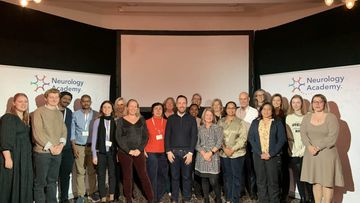Workstream D: Social determinants of health – Get involved
Dr Helen Ford, Consultant Neurologist at Leeds Teaching Hospitals, and Prof Gavin Giovannoni, Professor of Neurology at Barts and The London led the initial discussions for this workstream. They invite other MS Academy members to join as lead representatives to help take the projects forward.
Objectives:
- To review how the social determinants of health affect disease outcomes.
- To discuss social capital and how social prescribing may be useful for improving the QoL of people with MS.
Overview of the workstream
The workstream examined the evidence that people with lower socioeconomic indicators, such as income, lower educational attainment, obesity and smoking show quicker progression of MS. There was discussion that the data driven workstreams will have a natural skew to including the patients who remain in the system, with the implication that, without targeted intervention, the patients that everyone recognises as dropping between the cracks could be left behind.
A quick survey of workstream participants clearly showed that there is no systematic approach to screening for social determinants of health in routine practice. However, most participants had areas of specific interest that could be addressed under this initiative. Key areas for improvement identified in the brainstorm are presented in Figure 1.
[caption id="attachment_5258" align="alignnone" width="700"] Figure 1. Potential social barriers to health identified[/caption]
Figure 1. Potential social barriers to health identified[/caption]Our goals for the year ahead:
- Understand how many patients have dropped out of the MS specialist system
Workstream participants agreed it is important to work with GPs to better understand how many patients in the community have MS, and whether they are included in MS specialist services. There is a misconception that patients discharged by the service due to not attending are taken up by their GPs. This initiative has significant overlap with the data driven workstreams. - Develop a screening tool to identify people for inclusion on a high risk register
Some patients will benefit from regular follow-up (phone calls as well as visits) to ensure they don’t fall off the radar. The tool can be based on the geriatric assessment template, which is already embedded into many primary care systems. Workstream champions aim to leverage GP networks for training to recognize social vulnerabilities in their patients who have MS. These patients can then be referred to appropriate local services based on their needs and back to MS specialists to deal with their specific MS needs. - Develop a standard letter for newly diagnosed patients describing the importance of maintaining a healthy lifestyle
Workstream participants agreed they do not spend (or have) much time to go through and explain the impact that obesity, smoking, alcohol and exercise can have on disease progression. A standard letter signposting sources of information will be helpful. - Design a pragmatic social prescribing study
Social prescribing is a way to refer people to a link worker who can give people time, focusing on ‘what matters to me’ and taking a holistic approach. They connect people to community groups and statutory services for practical and emotional support. There is emerging evidence that social prescribing can lead to a range of positive health and wellbeing outcomes for people, such as improved quality of life and emotional wellbeing. This study will address how social prescribing can be implemented such that it includes the most disengaged and vulnerable patients living with MS. Careful thought will need to be given to outcome measures; it was suggested that a composite measure of health may be used.
More information:
- Read the background to this workstream
- View the timeline for how this fits into the bigger picture this year
- Find out about the other workstream’s goals
- Read an interview with Gavin where he delves more deeply into this workstream and why it’s so essential.
- Watch Sir Michael Marmot discuss Social Determinants of Health (2014 WORLD.MINDS) and Developing further action on reducing the social gradient in health
- Read our Spotlight article on inequalities in access to health and social care.
- Find out about the other workstream’s goals
[gallery size="large" ids="5228,5227,5229,5230,5235,5258"]
Related articles
Encouraging excellence, developing leaders, inspiring change
MS Academy was established five years ago and in that time has accomplished a huge amount. The six different levels of specialist MS training are dedicated to case-based learning and practical application of cutting edge research. Home to national programme Raising the Bar and the fantastic workstream content it is producing, this is an exciting Academy to belong to.


